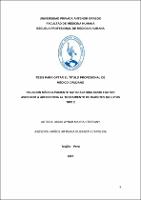Relación médico-paciente satisfactoria como factor asociado a adherencia al tratamiento de diabetes mellitus tipo 2

View/Open
Download
(application/pdf: 288.4Kb)
(application/pdf: 288.4Kb)
Date
2020Author(s)
Arias Aybar, Mayra Steffany
Metadata
Show full item recordAbstract
Determinar si la relación médico-paciente satisfactoria es un factor
asociado a la adherencia al tratamiento farmacológico en pacientes con diabetes
mellitus tipo 2 en dos Hospitales de Trujillo.
Material y métodos: Se realizó un estudio observacional, analítico, transversal.
La muestra estuvo constituida por 381 pacientes con diabetes mellitus tipo 2 de
dos Hospitales de Trujillo, que cumplieron con los criterios de selección, durante
el periodo Junio-Noviembre del 2018. Se aplicó el Cuestionario PREMEPA para
evaluar la calidad de la relación médico-paciente y la MMAS-8 para evaluar la
adherencia al tratamiento farmacológico de diabetes mellitus tipo 2.
Resultados: La proporción de adherencia al tratamiento farmacológico de
diabetes mellitus tipo 2 fue de 24,6% y de relación médico-paciente satisfactoria
fue de 77,1%. Se encontró asociación entre la relación médico-paciente
satisfactoria y la adherencia al tratamiento de diabetes mellitus tipo 2 (p= 0,001;
OR=0,284; IC 95% [0,136-0,591]). La proporción de relación médico-paciente
satisfactoria en el grupo con adherencia al tratamiento farmacológico de diabetes
mellitus tipo 2 fue de 90,4 %, mientras que en el grupo sin adherencia al
tratamiento de diabetes mellitus tipo 2 fue de 72,8%. La edad promedio de los
pacientes con adherencia al tratamiento farmacológico de diabetes mellitus tipo
2 fue 61,34 + 2,36 años. El análisis bivariado mostró que el menor régimen de
medicamentos diarios (1 vez al día) y el no tener complicaciones crónicas están
asociados significativamente a adherencia al tratamiento de diabetes mellitus
tipo 2. El análisis multivariado identificó a la relación médico-paciente
satisfactoria y menor régimen de medicamentos diarios (1 vez al día) como
factores asociados a adherencia al tratamiento farmacológico de diabetes tipo 2.
Conclusiones: La relación médico-paciente satisfactoria y el menor régimen de
medicamentos diarios (1 vez al día), son factores asociados a la adherencia al
tratamiento farmacológico en pacientes con diabetes mellitus tipo 2 en dos
Hospitales de Trujillo durante el periodo junio-noviembre del 2018. To determine if the satisfactory doctor-patient relationship is a factor
associated with adherence to drug treatment in patients with type 2 diabetes in
two Hospitals from Trujillo.
Material and methods: An observational, analytical, cross-sectional study was
carried out. The sample consisted of 381 patients with type 2 diabetes of two
Hospitals from Trujillo during June-November 2018, which met the selection
criteria. The PREMEPA Questionnaire was applied to assess the quality of the
doctor-patient relationship and MMAS-8 to assess adherence to the
pharmacological treatment of type 2 diabetes.
Results: The proportion of adherence to the pharmacological treatment of type
2 diabetes was 24.6% and the satisfactory doctor-patient ratio was 77.1%. An
association was found between the satisfactory doctor-patient relationship and
adherence to the treatment of type 2 diabetes mellitus (p = 0.001; OR = 0.284;
95% CI [0.136-0.591]). The proportion of satisfactory doctor-patient relationship
in the group with adherence to the pharmacological treatment of type 2 diabetes
was 90.4%, while in the group without adherence to the treatment of type 2
diabetes mellitus was 72.8%. The average age of patients with adherence to the
pharmacological treatment of type 2 diabetes was 61.34 + 2.36 years. The
bivariate analysis showed that the lower regimen of daily medications (once a
day) and doesn’t have late complications are significantly associated with
adherence to the treatment of type 2 diabetes mellitus. The multivariate analysis
identified the satisfactory doctor-patient relationship and the lowest regimen of
daily medications (once a day) as factors associated with adherence to the
pharmacological treatment of type 2 diabetes.
Conclusions: The satisfactory doctor-patient relationship and the lower daily
medication regimen (once a day) are factors associated with adherence to drug
treatment in patients with type 2 diabetes mellitus in two Hospitals from Trujillo
during June-November 2018.
Collections
- Medicina Humana [3196]

